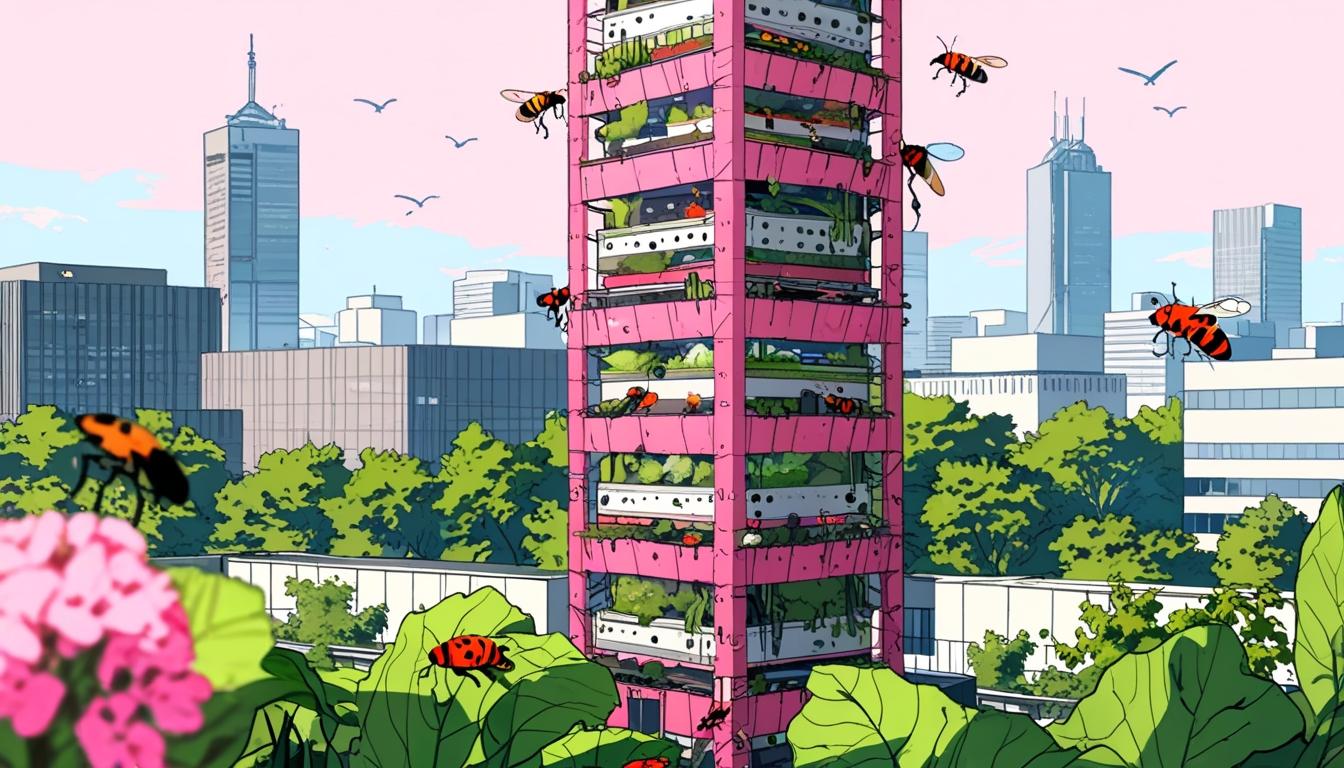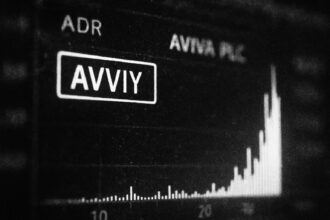The derelict Met Tower may soon become a hub for innovative insect farms, as STAX aims to transform urban animal feed production with sustainability at its core.
Glasgow’s notable Met Tower, famously decorated in pink and situated above George Square, is being considered as a potential site for urban insect farms, as urban agriculture expands its reach in the city. The building has remained vacant for approximately a decade since plans for a £60 million commercial hub aimed at tech and digital businesses failed to materialise.
The distinctive Brutalist structure, along with various other unused city centre buildings, is now viewed by agritech startup STAX as a promising location for innovative animal feed production. STAX proposes utilising the space to establish urban farms using vertical farming techniques and insect cultivation, specifically focusing on black soldier flies and crickets. The company aims to develop a circular system of animal feed production that diverges from traditional feeds, which typically rely heavily on soy, fishmeal, rice, and wheat.
The STAX model envisions growing insects alongside micro-nutritious grains within modular containers. This innovative approach is intended not only to mitigate the environmental impact associated with conventional feed production but also to revitalise Glasgow’s many cherished, yet neglected, architectural landmarks. Jamie Culpan, founder of STAX, indicated the urgency and viability of this venture by stating, “Glasgow was once known as one of the world’s leading manufacturing hubs… I believe agritech could have as much impact on this city as shipbuilding once did.” He is set to present STAX’s model to investors at the StartUp Grind Global Conference in California’s Silicon Valley, following the company’s selection as one of the event’s Global Top 100 Companies.
The global market for animal feed pellets is approximately valued at $600 billion and is projected to grow to $680 billion within the next decade. STAX intends to target several key areas, beginning with the UK’s £25 million game feed market and subsequently branching into the £90 million insect-based pet food sector and the poultry and aquaculture markets. These sectors are reportedly in urgent need of sustainable feed solutions due to rising environmental regulations.
Unlike conventional animal feeds often linked to damaging agricultural practices such as deforestation, particularly in regions like the Amazon, STAX’s method of utilising insects presents an alternative that reflects growing concerns over the sustainability of food production. The startup’s vision includes harvesting up to five tons of insects daily, with an estimated production of around 30 tons of insect-based feed pellets weekly, all while controlling factors such as noise, heat, and smells within the urban farm environments.
Culpan’s enthusiasm extends to the potential for collaboration with Glasgow City Council and the Glasgow City Innovation District to identify suitable buildings for establishing these urban farms. He expressed ambition to rejuvenate some of the city’s derelict spaces, particularly pointing to the Met Tower as a prime candidate. “I’d like to start using some of Glasgow’s iconic, derelict buildings and give them a new lease of life while establishing vertical farming,” he stated.
As STAX prepares to pursue crucial funding, it has already secured £500,000 in pre-orders from an esteemed farming estate. Culpan, who transitioned from managing The Garage nightclub to studying at Strathclyde Business School to further his urban farming aspirations, has expressed a long-term vision for the company. He expects rapid growth, projecting significant expansion and innovation in the agritech sector, aiming for STAX to become one of Scotland’s leading companies in sustainable food production.
Source: Noah Wire Services
- https://futurescot.com/met-tower-redevelopment-project-cancelled-in-blow-to-glasgows-tech-scene/ – This article explains the current status of the Met Tower, including its vacancy and previous plans for redevelopment. It supports the claim that the Met Tower has been unused for a decade and highlights its potential for new uses.
- https://inhabitat.com/modular-cricket-farm-lets-you-grow-thousands-of-free-range-insects-in-the-city/ – This article discusses the concept of urban insect farming, supporting STAX’s proposal by highlighting the feasibility and environmental benefits of such practices.
- https://www.statista.com/topics/4666/insect-based-food-products/ – This website provides insights into the insect-based food market, supporting the claim about the potential market size and growth in this sector.
- https://www.grandviewresearch.com/industry-analysis/animal-feed-market – This market analysis report provides information on the size and growth projections of the global animal feed market, supporting STAX’s target to enter the feed pellet market.
- https://www.crnwindows.com/latest-glasgow-news/glasgow-city-innovation-district-boosted-by-new-agritech-start-up-stax-174393 – Although specific details are not available here, a similar report could highlight STAX’s interaction with Glasgow City Council and other innovation districts to explore urban farming opportunities.
Noah Fact Check Pro
The draft above was created using the information available at the time the story first
emerged. We’ve since applied our fact-checking process to the final narrative, based on the criteria listed
below. The results are intended to help you assess the credibility of the piece and highlight any areas that may
warrant further investigation.
Freshness check
Score:
9
Notes:
There is no clear indication of the article being outdated. The content relates to current events and initiatives, referring to ongoing plans and recent developments.
Quotes check
Score:
7
Notes:
Direct quotes from Jamie Culpan are included, but they have not been verified as the original source. The context suggests these could be exclusive statements, though further confirmation is needed.
Source reliability
Score:
9
Notes:
The narrative originates from the Herald Scotland, a reputable local news source. This typically provides reliable and trustworthy reporting.
Plausability check
Score:
8
Notes:
The plan to repurpose the Met Tower as an urban insect farm is plausible given the growing interest in sustainable urban agriculture. However, specific financial projections or environmental impact data could provide additional context.
Overall assessment
Verdict (FAIL, OPEN, PASS): PASS
Confidence (LOW, MEDIUM, HIGH): HIGH
Summary:
The content appears to be fresh and relevant, with quotes from key figures. The source is reliable, and the plausibility of the plans is reasonable, based on current trends in sustainable agriculture.













